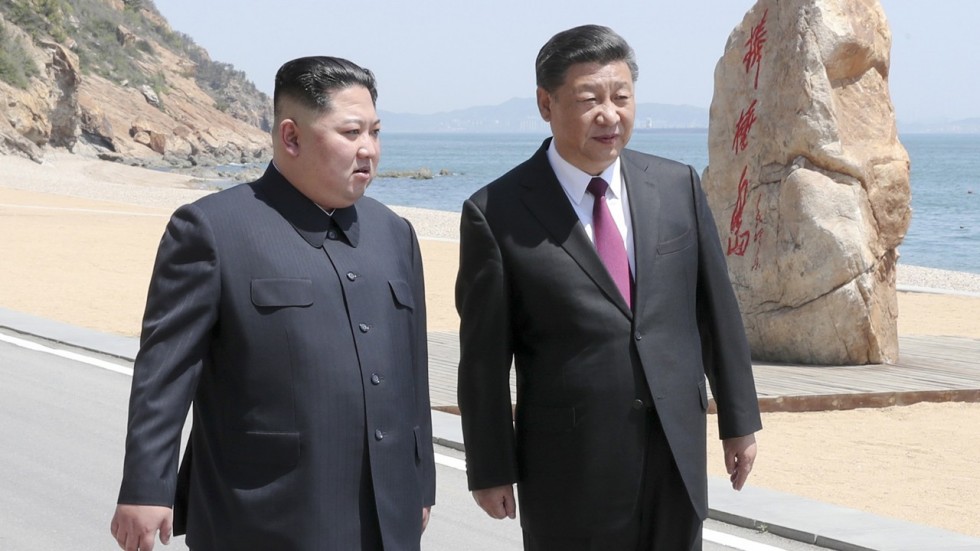
President Donald Trump tends to run hot and cold toward other nations and especially their leaders. He personalizes bilateral governmental relations. That creates both problems and opportunities, but what is not yet clear is which will predominate by the end of his presidency.
Today he appears to look favorably on Kim Jong-un, despite having shown frustration at what he believes to be the slow pace of North Korean denuclearization. The president recently lauded the “very warm, very positive letter” that he received from Kim and indicated that a second summit is in the works. In contrast, President Trump has said nothing positive recently about China’s President Xi Jinping, and U.S. relations with China have been deteriorating. Dominating the news are new attacks in a worsening trade war. Though America has an edge economically, Beijing is still hanging on. Having charted a more aggressive international course, President Xi can ill afford to retreat. The two leaders’ relationship is likely to worsen before it improves.
Nor is trade the only issue poisoning U.S.-China ties. The administration accused Beijing of interfering in the U.S. election and recently sanctioned the People’s Republic of China for purchasing Russian weapons. Even more incendiary may be the issue of Taiwan. The PRC has been increasing pressure on what it considers to be Chinese territory, while the U.S. announced a new arms sale with Taiwan and targeted countries that shifted their diplomatic recognition from Taipei to Beijing.
North Korea also appears to be dividing the U.S. and the PRC. Before President Trump’s recent praise for the North, he blamed China for Pyongyang’s lack of “sufficient progress.” The president suggested that his trade penalties had angered Beijing, and the latter was now sending “money, fuel, fertilizer, and various other commodities” to the North, which “is not helpful.”
No doubt, implementing a policy that undermines Chinese economic growth is not the best strategy to encourage cooperation with the PRC. And Chinese officials believe President Trump violated his assurances that he would back off trade sanctions if Beijing cracked down on commerce with the North. Chinese Foreign Ministry spokeswoman Hua Chunying observed: “Regarding America’s attempts to pass the buck, I’m sorry, we’d rather not accept.”
The main problem is that President Trump has assumed an outcome not mandated by the sparse June summit statement. Kim wants to survive; he would be a fool to turn over his nuclear arsenal – which constitutes most of his leverage – for nothing in return but promises of future benevolence. So the North Koreans argue that surrendering their nukes requires developing a relationship and peace regime first, as listed in the statement. Moreover, contrary to the assumption of some China critics, the PRC does not control North Korea. Pyongyang long balanced the Soviet Union against China. On his rise to ultimate power, North Korean founder Kim Il-sung eliminated his nation’s pro-Beijing faction, over sharp Chinese protests. Bilateral relations may have reached their nadir during Mao Zedong’s Cultural Revolution. Mao was a sharp critic of Kim turning his nation into something approximating a monarchy.
The PRC does not want a nuclear North, however inconvenient that might be for the U.S. Possession of atomic weapons enables Pyongyang to chart an independent course and engage in destabilizing behavior, which is not in Beijing’s interest. Until this spring Xi refused to meet Kim, demonstrating the former’s displeasure with the North’s provocative behavior. Over time China steadily tightened sanctions enforcement, triggering sharp North Korean criticism.
Since the summit Beijing appears to have relaxed economic controls, but certainly did not open the border. Moreover, President Xi held three summits with the Supreme Leader in quick succession and is expected in Pyongyang in the coming weeks for a fourth meeting. The last time a Chinese leader visited the North was in 2005, when President Hu Jintao met with Kim Jong-un’s father, Kim Jong-il.
The PRC was likely rewarding North Korea for its more responsible behavior, including the end of missile and nuclear tests. Moreover, the Chinese may have acted out of fear of being left out. To Kim, the U.S. is a distant, less dangerous power, which could help the Democratic People’s Republic of Korea balance against the large, historical hegemon next door. On my visit to the DPRK last year, officials expressed their desire not to be dependent on any one nation, and it was obvious to whom they were referring. America’s involvement could reduce Beijing’s leverage over Pyongyang. Thus, the Xi government felt a need to bid for Pyongyang’s affection.
Instead of whining about China’s stance, President Trump should address Beijing’s interests in the North’s future. The PRC has two major concerns. The first is to avoid a potentially catastrophic North Korean collapse, which could spew refugees into China, spark violent factional fighting, create a humanitarian tragedy and result in loose nuclear weapons. Moreover, Beijing does not want a unified Korea allied with America, resulting in U.S. troops on its border.
Washington should indicate that China has nothing to fear from a reformed DPRK — that, for instance, Washington would not attempt to turn a united peninsula into part of a regional security system designed to contain the PRC. Such assurances could make the Xi government more willing to work with the U.S. in shaping the future of the two Koreas.
Winning the Cold War helped trigger a tsunami of hubris in Washington. “What we say goes” became Washington’s attitude. But that approach has been a failure, especially in responding to a rising nationalistic power like China. Even before President Trump initiated his trade war, President Xi had little reason to assist America against the North.
President Trump still could change course, enlisting Beijing to promote a far-reaching disarmament deal with the North. Against all odds he has created opportunities for change and reform in the DPRK that previously did not exist. He now must complete the process
